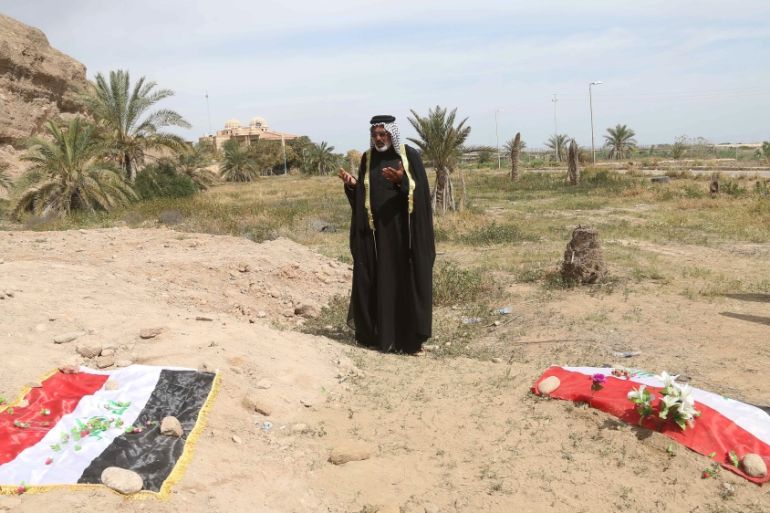Five years on, still no justice for Iraq’s Camp Speicher victims
Flawed trials and half-truths cannot bring justice for all those killed and forcefully disappeared at Camp Speicher.

Today marks five years since the Camp Speicher massacre, in which an estimated 1,700 unarmed cadets were executed by the Islamic State in Iraq and the Levant (ISIL or ISIS), and hundreds more were arrested and disappeared by Iraqi government forces. For the victims’ families, today is a stark reminder of the Iraqi government’s consistent and overwhelming failure to determine their loved ones’ fates and whereabouts, and to bring the perpetrators to justice.
On June 12, 2014, thousands of unarmed cadets were training at Camp Speicher, a military base in Salah al-Din Province in Iraq. As news spread that Tikrit had fallen to ISIL, 3,000 cadets were ordered by their superiors to change into civilian clothes, leave Camp Speicher and head home for a 15-day break. In the events that followed, many of them were captured by ISIL fighters, who separated the Sunnis from the Shia and non-Muslims, before taking the latter two to various locations around Tikrit and executing them one by one. Their bodies were later dumped into mass graves or thrown into the Tigris River.
Keep reading
list of 4 itemsAustin confirms Russians deployed to airbase housing US military in Niger
What’s next as ‘heavy-handed’ US negotiates pullout from Niger?
Putin says ‘radical Islamists’ behind Moscow concert hall attack
Approximately 400 other cadets were arrested by Iraqi government forces during incursions into various areas in and around Tikrit, and accused of having deserted their military duties. Despite some families having been able to obtain photo evidence showing their loved ones detained in Iraqi government prisons alongside other Camp Speicher cadets, the Iraqi authorities have refused to acknowledge that they are in its custody.
While the Iraqi government has begun to exhume bodies from mass graves believed to contain the remains of the Camp Speicher victims, these efforts have been slow and severely flawed. This has left families anguished, uncertain as to whether their loved ones were among those executed by ISIL, or if they are part of the group being held secretly by the Iraqi authorities.
The Iraqi Mass Graves Directorate, a branch of government responsible for overseeing mass grave excavations in the country, lacks the necessary human and material resources to carry out its work. This includes insufficient storage space, a lack of the most basic equipment such as gloves and masks, and only 43 staff charged with the colossal task of managing the excavations of the over 200 mass graves documented in Iraq to date. As a result, it has been recently estimated that at the current rate, it would take 800 years for operations to be completed.
In addition, the draft Speicher Law, proposed by Iraqi legislators in early 2019 as a means to prosecute individuals involved in the massacre, is severely flawed and fails to meet international legal standards. While the law has not yet been put on the parliamentary schedule for review, this could happen at any time. If adopted, it would further impede the search for justice of victims’ families.
Firstly, the draft law defines all victims as “martyrs”, failing to acknowledge that some cadets are being held in secret detention by Iraqi authorities or to provide measures to ensure that investigations are carried out into their fate and whereabouts. It also absolves Iraqi government forces and pro-government militias of any responsibility, as it defines ISIL as the sole perpetrator of the crimes committed against the Camp Speicher cadets.
Furthermore, the law calls on the judicial authorities to impose “legal punishments” on “perpetrators, participants, enablers and instigators” of crimes at Camp Speicher. However, it fails to specify the nature of the punishments or how their severity differs depending on the level of the individual’s involvement in the crime. As a consequence, the law enables Iraqi judges to hand out the same sentences to those who willingly committed the most serious crimes at Camp Speicher, as to those who had no choice but to participate.
The proposed Speicher Law thus highlights the Iraqi authorities’ perception that justice can only be done if no mercy is shown to anyone with real or perceived ISIL affiliations.
However, this approach is misguided and counterproductive: by attempting to remedy gross human rights violations with equally gross violations, all the Iraqi government has done is to increase the likelihood of the re-emergence of ISIL.
In fact, the shortcomings of the draft Speicher Law are remarkably similar to those of the Iraqi Anti-Terrorism Law, which imposes a mandatory death sentence for anyone who perpetrates, participates in or covers up a terrorist act. It is on the basis of this law that dozens have been executed in relation to the Camp Speicher massacre following unfair trials which lasted for a few minutes each and which were marred with allegations of torture. In no way do such flawed prosecutions achieve justice for the Camp Speicher victims or their families.
Five years on, it is time that the Iraqi authorities granted the families of the Camp Speicher victims their right to know the truth about the events that unfolded in June 2014. This not only means dedicating extra resources to mass grave excavations, so that victims’ remains may be returned to their relatives, but it also requires acknowledging that some of the cadets may still be alive and in Iraqi custody, and taking appropriate measures to ensure their release.
Moreover, the Iraqi authorities owe it to the victims to instigate the reforms necessary for the creation of a just legal system capable of holding all perpetrators to account and ensuring that the tragedy at Camp Speicher never happens again.
The views expressed in this article are the author’s own and do not necessarily reflect Al Jazeera’s editorial stance.
